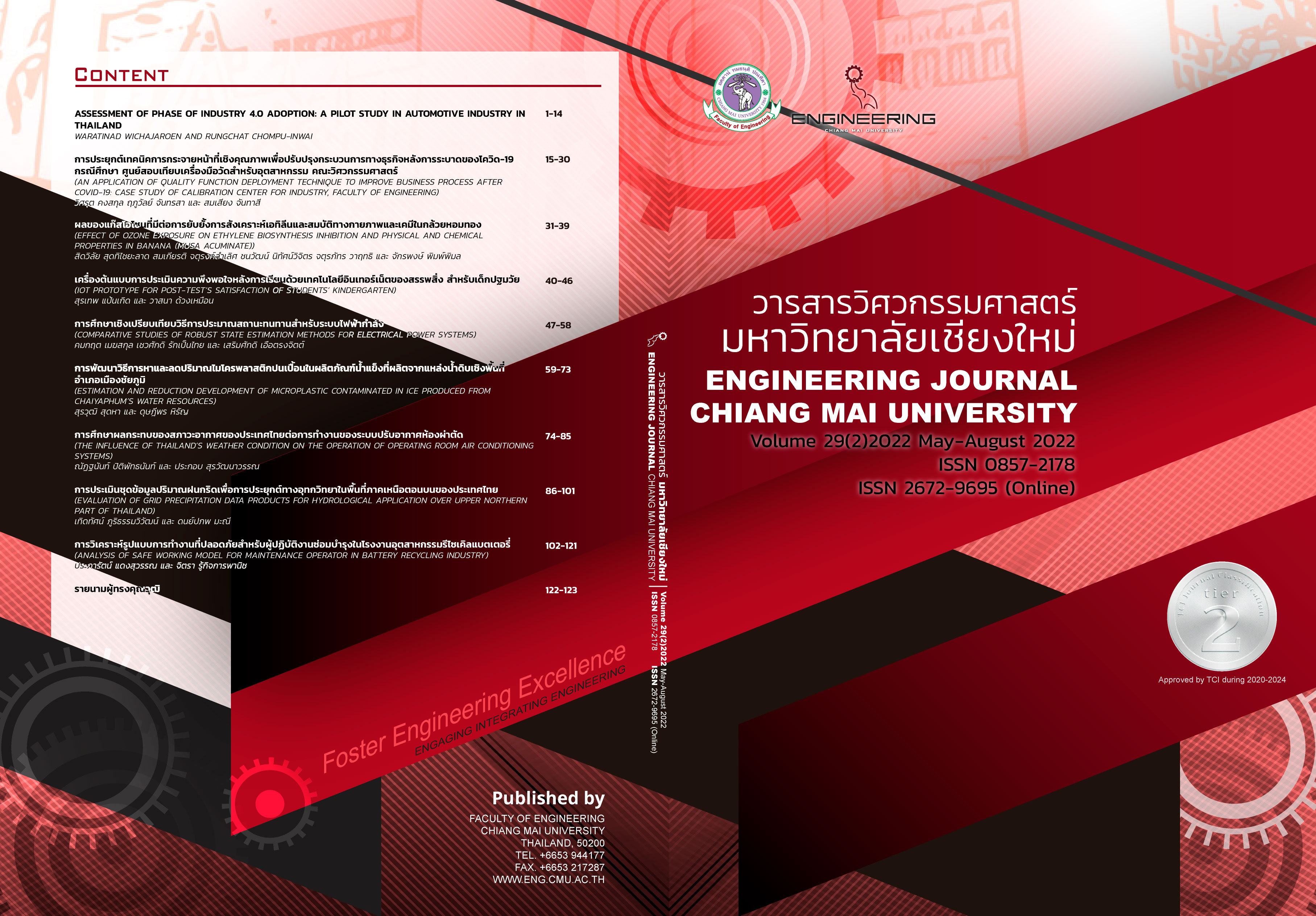Comparative Studies of Robust State Estimation Methods for Electrical Power System
Keywords:
power system state estimation, robust state estimation, bad dataAbstract
This paper presents the comparative studies of six robust state estimation methods, i.e., least absolute value method, quadratic-constant method, quadratic-linear method, square root method, Schweppe-Huber generalized M method, and maximum exponential square method for power system state estimations. The IEEE 14-bus and 57-bus systems are used to test the performances of the robust estimation methods. The measurement datasets consist of voltage magnitude, power flow, and power injection. In addition, the influence of the constant parameters of objective functions of some robust state estimations is studied. Comparison results in terms of solution convergence, computation time, and estimation accuracy are presented.
References
A. Monticelli, State Estimation in Electric Power Systems: A Generalized Approach, New York: Springer, 1999.
L. Mili and T. Van Cutsem, “Implementation of the hypothesis testing identification in power system state estimation,” IEEE Transactions on Power Systems, vol. 3, no. 3, Aug., pp. 887-893, 1988.
A. Abur and A. Gómez-Expósito, Power System State Estimation: Theory and Implementation, New York: Marcel Dekker, 2004.
M. R. Irving, R. C. Owen and M. J. H. Sterling, “Power system state estimation using linear programming,” Proceedings of the Institution of Electrical Engineers, vol. 125, no. 9, Sep., pp. 879-885, 1978.
R. A. Jabr and B. C. Pal, “Iteratively re-weighted least absolute value method for state estimation,” IEE Proceedings - Generation, Transmission and Distribution, vol. 150, no. 4, Jul., pp. 385-391, 2003.
C. Rakpenthai, S. Uatrongjit, I. Ngamroo and N. R. Watson, “Weighted least absolute value power system state estimation using rectangular coordinates and equivalent measurement functions,” IEEJ Transactions on Electrical and Electronic Engineering, vol. 6, no. 6, Nov., pp. 534-539, 2011.
M. Göl and A. Abur, “LAV based robust state estimation for systems measured by PMUs,” IEEE Transactions on Smart Grid, vol. 5, no. 4, Jul., pp. 1808-1814, 2014.
E. Handschin, F. C. Schweppe, J. Kohlas and A. Fiechter, “Bad data analysis for power system state estimation,” IEEE Transactions on Power Apparatus and Systems, vol. 94, no. 2, Mar., pp. 329-337, 1975.
R. Baldick, K. A. Clements, Z. Pinjo-Dzigal and P. W. Davis, “Implementing nonquadratic objective functions for state estimation and bad data rejection,” IEEE Transactions on Power Systems, vol. 12, no. 1, Feb., pp. 376-382, 1997.
L. Mili, M. G. Cheniae, N. S. Vichare and P. J. Rousseeuw, “Robust state estimation based on projection statistics,” IEEE Transactions on Power Systems, vol. 11, no. 2, May., pp. 1118-1127, 1996.
W. Wu, Y. Guo, B. Zhang, A. Bose and S. Hongbin, “Robust state estimation method based on maximum exponential square,” IET Generation, Transmission & Distribution, vol. 5, no. 11, Nov., pp. 1165-1172, 2011.
เชวศักดิ์ รักเป็นไทย และ เสริมศักดิ์ เอื้อตรงจิตต์, “การเปรียบเทียบวิธีการประมาณสถานะทนทานสำหรับการประมาณสถานะระบบไฟฟ้ากำลัง,” ในการประชุมวิชาการทางไฟฟ้า ครั้งที่ 40, โรงแรม เดอะซายน์, จังหวัดชลบุรี, 2560.
Y. Chen and N. Zhou, “A comparative study on state estimation algorithms for power systems,” The 52nd North American Power Symposium (NAPS), 2021, pp. 1-6.
C. Rakpenthai and S. Uatrongjit, “A robust WLAV state estimation based on pseudo-voltage measurements,” IEEJ Transactions on Electrical and Electronic Engineering, vol. 15, no. 6, Jun., pp. 854–862, 2020.
T. Chen, H. Ren, E. Y. S. Foo, L. Sun and G. A. J. Amaratunga, “A fast and robust state estimator based on exponential function for power systems,” IEEE Sensors Journal, vol. 22, no. 6, Mar., pp. 5755-5767, 2022.
R. Christie, "Power systems test case archive-UWEE," [Online]. Available: https://labs.ece.uw.edu/pstca/. [Accessed May. 19 2022].
Downloads
Published
Issue
Section
License
ลิขสิทธิ์ของบทความที่ตีพิมพ์ในวารสารฉบับนี้จะยังเป็นของผู้แต่งและยินยอมให้สิทธิ์เผยแพร่กับทางวารสาร
การเผยแพร่ในระบบวารสารแบบเปิดนี้ บทความจะสามารถนำไปใช้ได้ฟรีในการศึกษา และในทางที่ไม่เกี่ยวกับการค้า




